Kate Jenkins – a force for law-making
The Sex Discrimination Commissioner’s legacy
Syllabus
- 11PAL – role of the legislative branch
- 12PAL – functions of the Commonwealth Parliament – law-making, representation
- 12PAL – law-making process in Parliament – influence of individuals & political parties
- 12PAL – accountability of Parliament – judicial review
- 12PAL – accountability of executive – judicial review
- 12PAL – how Australia protects human rights
Essential understandings
- 11PAL – political participation
- 12PAL – popular participation
Keywords
- Sex Discrimination Amendment (Prohibiting All Sexual Harassment) Bill 2021
- Sex Discrimination and Fair Work (Respect at Work) Amendment Bill 2021
- Parliamentary Workplace Reform (Set the Standard Measures No. 1) Bill 2022
- Anti-Discrimination and Human Rights Legislation Amendment (Respect at Work) Bill 2022
Kate Jenkins is retiring after seven years as Sex Discrimination Commissioner following the expiry of her term. She is a highly regarded and accomplished lawyer, academic, and human rights advocate who significantly impacted the law-making process in Parliament during her time in office. She is known for her commitment to promoting gender equality and respect for human rights in the workplace and for her key role in developing two influential reports on workplace harassment and discrimination in Australia.
Kate Jenkins was born in Melbourne, Australia, in 1965 and grew up in regional Victoria. She graduated in law from Monash University in 1988. Jenkins worked as a solicitor for a private law firm specialising in employment and discrimination law. She also practised as a barrister.
Jenkins became the Victorian Equal Opportunity and Human Rights Commissioner in 2006, responsible for administering that state’s Charter of Human Rights and Responsibilities Act and other rights laws. In this role, she gained a reputation for dealing with complex legal and social issues and promoting human rights.
In 2016, Jenkins was appointed as the Sex Discrimination Commissioner of Australia. The Sex Discrimination Commissioner is an officer of the Australian Human Rights Commission and works alongside other anti-discrimination commissioners for human rights, race, age, disability, and Aboriginal and Torres Strait Islander social justice and others. Her responsibility included promoting gender equality and advocating for the elimination of discrimination and harassment based on sex, gender identity, and intersex status.
As Sex Discrimination Commissioner, Jenkins produced the Respect@Work Report, a milestone study of workplace harassment and discrimination in Australia. The report was commissioned by the Australian government in 2018, following the international #MeToo movement, and was designed to evaluate the extent of sexual harassment in Australia.
In 2021, Jenkins completed her second influential report for the Morrison Government. It followed allegations raised by parliamentary staffer Brittany Higgins. The Set the Standard: Independent Review into Commonwealth Parliamentary Workplaces Report identified a culture of sexism and harassment in Parliament, with women working in Parliament House facing harassment and discrimination daily.
Jenkins’ reports gave voice to the experiences of millions of women in Australia, such as those who participated in the March4Justice rally outside Parliament House on 4 March 2021.
The Respect@Work Report investigated sexual harassment in Australian workplaces. The report led to a private members’ bill by Teal independent Zali Steggall. Ms Steggall introduced her bill in the House of Representatives on 15 March 2021, but it did not proceed. It was called the Sex Discrimination Amendment (Prohibiting All Sexual Harassment) Bill.
However, the Respect@Work Report and Zali Steggall’s bill spurred the Morrison Government to introduce the Sex Discrimination and Fair Work (Respect at Work) Amendment Bill 2021 in June 2021. It amended the Sex Discrimination Act 1984 (SDA), the Fair Work Act 2009 and the Australian Human Rights Commission Act 1986.
A second government bill – Parliamentary Workplace Reform (Set the Standard Measures No. 1) Bill 2022 – included recommendations from the Set the Standard Report, namely that MPs and judges be included under the SDA.
Together, the Morrison Government bills achieved the following:
- Strengthened existing sexual harassment protection.
- Extended sex-based harassment to include areas of public life, such as staff and consultants employed by Members of Parliament, courts and other government agencies.
A new round of law-making in Parliament followed with the change of government in May 2022. The Albanese Government introduced the Anti-Discrimination and Human Rights Legislation Amendment (Respect at Work) Bill 2022. It implemented additional Repect@Work Report recommendations. The new law:
- Extended redress to include civil as well as criminal law by ensuring victims can sue for victimising conduct causing unlawful discrimination.
- Imposed a positive duty on employers to take reasonable and proportionate measures to eliminate unlawful sex discrimination.
- Empowered the Australian Human Rights Commission to monitor employers’ compliance with the positive duty.
Jenkins’ work as Sex Discrimination Commissioner and her reports on workplace harassment and discrimination have significantly impacted law-making in Australia. Her advocacy for workplace equality and safety has led to many reforms, including stronger anti-discrimination laws, increased penalties and new civil remedies for workplace harassment and assault.
Importantly, the accountability of parliamentarians and judges has been increased by extending the SDA to include them so that they may be prosecuted or sued in a court for sexual harassment.
Application to PAL
11PAL & 12PAL
- Two roles of the legislative branch are to represent the community and make laws. People participate in the political system in various ways, including protests like the March4Justice.
- Another form of participation is contributing to inquiries, such as Kate Jenkin’s two reports:
-
- Respect@Work Report in response to the #MeToo movement; and
- Set the Standard: Independent Review into Commonwealth Parliamentary Workplaces in response to allegations of sexual harassment in Parliament House workplaces.
-
Jenkins’ reports informed Parliament about serious issues and led to several laws that reflected the popular will to improve the safety of women in particular.
12PAL
- Individuals like Kate Jenkins influence law-making in the Parliament. Jenkins’ previous roles as a lawyer and Victorian Equal Opportunity and Human Rights Commissioner make her a highly skilled advocate. Her appointment as Sex Discrimination Commissioner gave her a position where her advocacy skills could be very influential.
- Context can be very important for individuals to influence law-making. The #MeToo movement and women’s experiences as employees at Parliament House provided the situation in which Kate Jenkins’ position and skills could be exceptionally influential.
- Zali Steggall is another individual who influenced law-making in Parliament. Jenkin’s Respect@Work Report was the catalyst for her private members’ bill. Although her Sex Discrimination Amendment (Prohibiting All Sexual Harassment) Bill 2021 failed to pass, it provoked the Morrison Government into action. Within three months, the government introduced its own bill, incorporating much of Staggall’s bill. The Sex Discrimination and Fair Work (Respect at Work) Amendment Bill 2021 was assured passage in the House of Representatives because it was a government bill. It passed the Senate relatively easily because of the strong popular will outlined above.
- The Albanese Government’s Anti-Discrimination and Human Rights Legislation Amendment (Respect at Work) Bill 2022 is another statute influenced by Jenkins. It went further than the Sex Discrimination and Fair Work (Respect at Work) Amendment Bill 2021 by including more of Jenkin’s recommendations.
- Individuals normally do not have the capacity to influence law-making in Parliament to the extent Kate Jenkins has. Her example illustrates some of the factors that increase the potential of doing so – knowledge, skill, and position. Zali Steggall’s capacity to influence law-making in Parliament derives from her position as an independent MHR.
- Political parties have significantly more influence over law-making in Parliament – especially if they are in government where they can command the lower house. The Coalition parties (Liberal and Nationals) were able to defeat Steggall’s private members’ bill and then co-opt much of it in their own government bill – claiming credit for taking action. The Albanese Government passed its related bill relatively easily. This was in spite of some objections from business pressure groups who said the positive duty on employers to take reasonable and proportionate measures to eliminate unlawful sex discrimination would be too costly and difficult to implement.
- Members of Parliament, executive officials (like ministers) and judges are now legally accountable for sexual harassment. This means they may be prosecuted for sexual harassment or sued if their predatory conduct leads to unfair dismissal of the victim. The changes bring this aspect of their conduct under judicial review. Employees working in Parliament House and other areas of public life like the courts will have a safer workplace, equivalent to that in the public service and private sector.
- Australia protects human rights in a variety of ways. One of the most significant ways is through a series of anti-discrimination and other rights statutes that codify international human rights into Australian law. Overseeing these statutes is the Australian Human Rights Commission (AHRC). Each anti-discrimination law is administered by an anti-discrimination commissioner within the AHRC. Complaints are made to the relevant commissioner, who attempts to resolve them through mediation. A major role of the AHRC is education and rights awareness to prevent abuses from occurring in the first place. Victoria, the ACT and Queensland have charters of rights administered by their own human rights commissions. Kate Jenkins led the Victorian Equal Opportunity and Human Rights Commission and served as Sex Discrimination Commissioner at the AHRC.
Questions
11PAL
- What is meant by political participation?
- Outline two differences between private members’ bills and government bills.
- Discuss two roles of the legislative branch in the Australian political and legal system.
12PAL
- What is the legislative function of the Commonwealth Parliament?
- Outline two ways individuals may influence the law-making process in Parliament.
- Discuss the extent to which individuals and political parties may influence the law-making process in Parliament.


